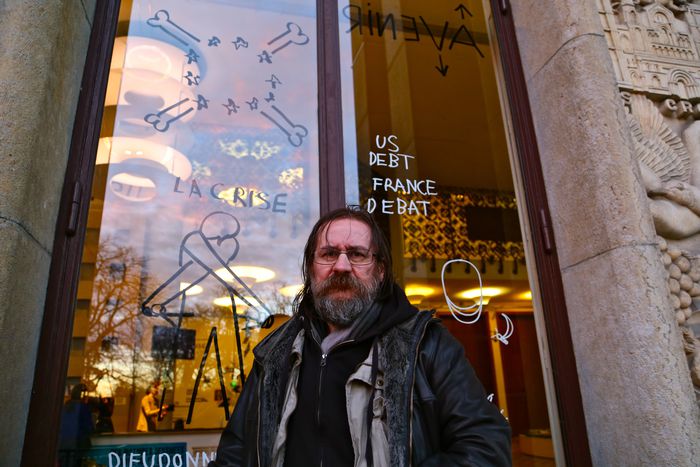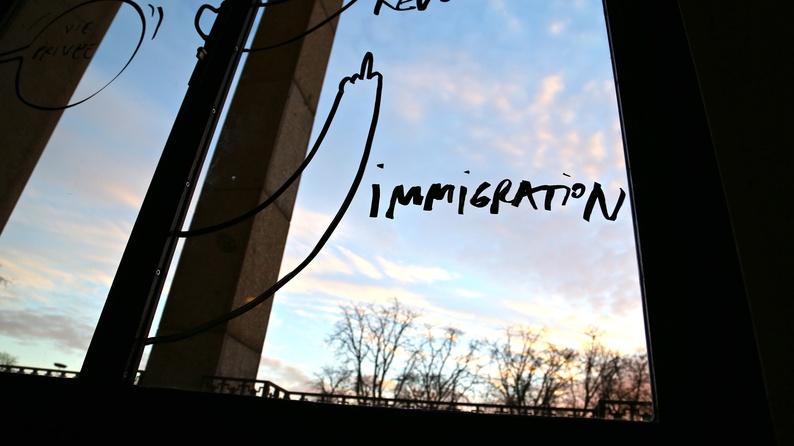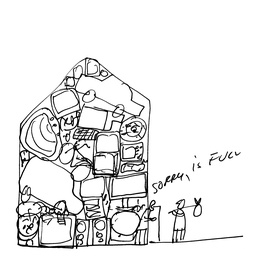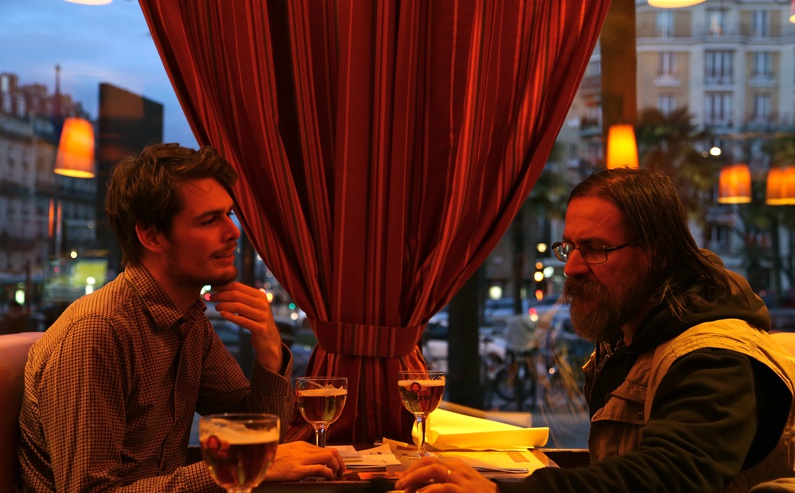
Dan Perjovschi: "I grew up in your Utopia"
Published on
Translation by:
CafébabelDan Perjovschi, born in 1961 in the Romanian town of Sibiu, is a star of the international arts scene. At the bar in Paris where we meet, the elegant Cité director welcomes him warmly and full of admiration – to the amazement of our waiter. We discuss art, immigration and argue about socialism
Dan is in the process of drawing on the windows of the Cité nationale de l'histoire de l'immigration in Paris using black and white marker pens. Working without colour is more radical, he explains. Dan has made a name for himself as an artist and cartoonist working with words and drawings. After the collapse of socialism, he became actively involved in shaping Romania’s new civil society.
His work always involves some commentary on current events in the country he resides in at the time. Now, in Paris, he picks up on issues such as President Hollande's affair, the controversial comedian Dieudonné, and Gérard Depardieu’s emigration to Russia. Dan’s work has been featured at the MoMa in New York, the Tate Modern in London and at the Ruhrtriennale in Germany.
Café Babel: Have you been following the debate about Romanian and Bulgarian immigration?
Dan Perjovschi: In Britain, where immigration is a particularly hot topic, you see a lot of fear mongering along the lines of “these people are coming here to take your jobs”! The truth is that we’re coming to clean toilets. There are also plenty of doctors and nurses coming from Poland, Romania and Bulgaria – which is the reason we have hardly any doctors left at home. Yes, of course, some of us come to steal and beg, but we also come to look after your old people. Something that people in the West no longer have time for.
Why is it that Romanians and Bulgarians are getting so much bad press?
Dan Perjovschi: The Romanian government has done nothing to counter the bad reputation its immigrants are now getting. It was quite obvious that the debate would intensify once the temporary controls ended on 1st January 2014. Here in Paris, the Romanian exile community goes back a long way. The sculptor Constantin Brancusi is on display at the Centre Pompidou and Ionesco’s plays are shown in the theatres. Romanians have already made their mark in Western Europe – yet no politician in Romania talks about that. To me, this situation is ludicrous.
 How are immigrants welcomed in Romania?
How are immigrants welcomed in Romania?
Dan Perjovschi: To be honest with you: Romanians are racist. Gypsies are blamed for everything. All media coverage about the Roma has something to do with crime. Roma are given obligatory seats in parliament, but they are not part of the debate. It’s a disgrace.
How do you address these issues in your art?
 Dan Perjovschi: I am not a political artist. I am an artist with a political agenda. I haven’t taken part in any demonstrations, but some people have downloaded my work from Facebook to print it out and take with them to demonstrations. I am first and foremost an artist and can’t dedicate my life to being a protester, like some Greenpeace activists who chain themselves to parliamentary buildings. Nevertheless, I have a moral stance.
Dan Perjovschi: I am not a political artist. I am an artist with a political agenda. I haven’t taken part in any demonstrations, but some people have downloaded my work from Facebook to print it out and take with them to demonstrations. I am first and foremost an artist and can’t dedicate my life to being a protester, like some Greenpeace activists who chain themselves to parliamentary buildings. Nevertheless, I have a moral stance.
Which is?
Dan Perjovschi: You’ll probably be shocked to hear this, but I don’t think much of socialist theory. I grew up in your Utopia, and I can tell you: it was no good.
Perhaps it was just that socialism was badly implemented.
Dan Perjovschi: It’s my life and not yours. I’m the one who has lived on the side of the Berlin Wall that had no graffiti, no freedom of speech… In our society everything was controlled. So, please don’t give me any bullshit about the socialist ideal!
But the socialist ideal did not include a Stasi.
Dan Perjovschi: Then show me one socialist country without a secret police.
Is it better today with the NSA?
 Dan Perjovschi: Just come to my country and see for yourself what damage socialism has done to it, and then complain about Western Europe. I have lived in socialist Romania: a combination of North Korea and an extremely nationalist ideology.
Dan Perjovschi: Just come to my country and see for yourself what damage socialism has done to it, and then complain about Western Europe. I have lived in socialist Romania: a combination of North Korea and an extremely nationalist ideology.
And yet you criticise the current system with your art.
Dan Perjovschi: The political system has to change. Because I cannot understand why the politicians are able to make decisions, and I – as an artist – am not.
What is the difference between the old socialist system and Romania today?
Dan Perjovschi: I grew up in a non-market economy. So all I could do was try to please my friends – since I wasn’t able to earn any money. After 50 years in the gulag of socialist ideology you want independence, individuality and wealth. However, 25 years after the collapse of socialism, I am gradually shifting to the left. We now also have a market for the arts in Romania. Young artists dream about having their work on show at the Basel art fair and being able to make money.
The video was produced by Alexandre Martinez for Café Babel.
The article was translated from the German by Betti Moser.
This article is part of Cafébabel's 'Immigration Dossier', a series of articles exploring immigration in the EU.
Translated from Dan Perjovschi: „Ich komme aus eurem Utopia“



